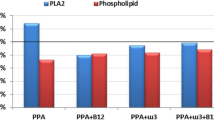Abstract
Phospholipase D (PLD) is emerging as a major player in many novel signaling pathways. Based on recent studies correlating membrane composition with enzyme function, we speculated that feeding of dietary lipids to the newborns has a major impact on brain PLD activity. To test this hypothesis, the rat dams were fed fat-free powder containing either safflower oil or fish oil, and a control powdered chow. The pups were weaned onto the diet and sacrificed at 30 days of age. PLD activity was measured by transphosphatidylation assays using rat brain membranes. This study shows that microsome GTPγS-dependent PLD activity in rats fed safflower oil or fish oil was significantly reduced by 38% and 30% respectively compared to controls. Oleate-dependent PLD activity in the safflower oil group, however, was significantly increased by 38%. In contrast, synaptosome membrane (P2) GTPγS-dependent PLD activity in rats consuming safflower oil was significantly increased by 29%, but there was no difference in oleate-dependent PLD activity. Likewise, no difference was observed in microsome oleate-dependent PLD and P2 GTPγS-dependent PLD activity between the fish oil and the control groups. These results indicate that dietary lipid intake appears to modulate phospholipid metabolism and differential expression of PLD isozymes in the brain.
Similar content being viewed by others
REFERENCES
Exton, J. H. 1994. Phosphatidylcholine breakdown and signal transduction. Biochim. Biophys. Acta. 1212:26–42.
Holler, T., Cermak, J. M., and Blusztajn, J. K. 1996. Dietary choline supplementation in pregnant rats increases hippocampal phospholipase D activity of the offspring. FASEB J. 10:1653–1659.
Kiss, Z. 1996. Regulation of phospholipase D by protein kinase C. Chem. Phys. Lipids 80:81–102.
Liscovitch, M. 1996. Phospholipase D: role in signal transduction and membrane traffic. J. Lipid Mediat. Cell Sign. 14:215–221.
Sun, G. Y., Huang, H. M., Kelleher, J. A., Stubbs, E. B., and Sun, A. Y. 1988. Marker enzymes, phospholipids and acyl group composition of a somal plasma membrane fraction isolated from rat cerebral cortex: a comparison with microsomes and synaptic plasma membranes. Neurochem. Int. 12:69–77.
Nakamura, S., Shimooku, K., Akisue, T., Jinnai, H., Hitomi, T., Kiyohara, Y., Ogino, C., Yoshida, K., and Nishizuka, Y. 1995. Mammalian phospholipase D: activation by ammonium sulfate and nucleotides. Proc. Natl. Acad. Sci. USA 92:12319–12322.
Brown, J. M., Gutowski, S., Moomaw, C. R., Slaughter, C., and Sternweis, P. C. 1993. ADP-ribosylation factor, a small GTP-dependent regulatory protein stimulates PLD activity. Cell 75:1137–1144.
Massenburg, D., Han, J. S., Liyanage, M., Patton, W. A., Rhee, S. G., Moss, J. and Vaughan, M. 1994. Activation of rat brain phospholipase D by ADP-ribosylation factors1, 5, and 6: separation of ribosylation factor-dependent and oleate-dependent enzymes. Proc. Natl. Acad. Sci. USA 91:11718–11722.
Singer, W. D., Brown, H, A., Bokoch, G. M., and Sternweis, P. C. 1995. Resolved phospholipase D activity is modulated by cytosolic factors other than Arf. J. Biol. Chem. 270:14944–14950.
Bourre, J. M., Francois, M., Youyou, A., Dumont, O., Piciotti, M., Pascal, G. and Durand, G. 1989. The effects of dietary α-linolenic acid on the composition of nerve membranes, enzymatic activity, amplitude of electrophysiological parameters, resistance to poisons and performance of learning tasks in rats. J. Nutrit. 119:1880–1892.
Hannah, J., and Campagnoni, A. T. 1987. Effect of essential fatty acid deficiency on mouse brain development. Dev. Neurosci. 9:120–127.
Crawford, M. A., Doyle, W., Leaf, A., Leighfield, M., Ghebremeskel, K., and Phylactos, A. 1993. Nutrition and neurodevelopmental disorders. Nutrit. Health 9:81–97.
Freeman, E. J., Terrian, D. M., and Dorman, R. V., 1990. Presynaptic facilitation of glutamate release from isolated hippocampal mossy fiber nerve endings by arachidonic acid. Neurochem. Res. 15:743–750.
Gerbi A., Zerouga, M., Debray, M., Durand, G., Chanez, C., and Bourre, J. M. 1994. Effect of fish oil diet on fatty acid composition of phospholipids of brain membranes and on kinetic properties of Na,K-ATPase isoenzymes of weaned and adult rats. J. Neurochem. 62:1560–1569.
Provost, J. J., Fudge, J., Israeli, S., Siddiqi, A. R., and Exton, J. H. 1996. Tissue-specific distribution and subcellular localization of phospholipase D in rat: evidence for distinct RhoA-and ADP-ribosylation factor-regulated isoenzymes. Biochem. J. 319:285–291.
Anthes, J. C., Wang, P., Siegel, M. I., Egan, R. W., and Billah, M. M. 1991. Granulocyte phospholipase D is activated by a guanine nucleotide dependent protein factor. Biochem. Biophys. Res. Commun. 175:236–243.
Author information
Authors and Affiliations
Rights and permissions
About this article
Cite this article
Peng, JH.F., Rhodes, P.G. Effect of Dietary Lipids on Phospholipase D Activity in Rat Brain. Neurochem Res 24, 975–979 (1999). https://doi.org/10.1023/A:1021068807265
Issue Date:
DOI: https://doi.org/10.1023/A:1021068807265




